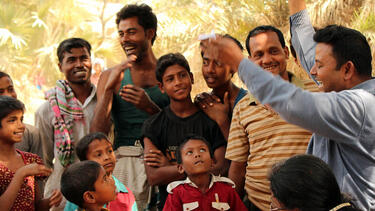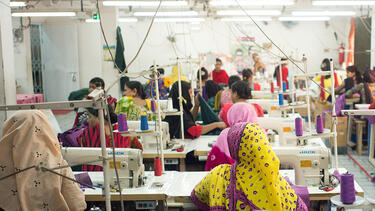Ahmed Mushfiq Mobarak
Does Immigration Create Jobs?
Research shows that, contrary to much of the rhetoric on the topic, immigration can contribute to economic growth and expansion of the labor market
Can Improving Farming Productivity Save the Rainforest?
Research by Mushfiq Mobarak suggests that improved crop productivity through electrification pushes Brazilian farmers away from land-intensive cattle grazing.
The Nobel Prize in Economics and the Dangers of Foreign Aid
Professor A. Mushfiq Mobarak argues that claims about the impact of foreign aid should be tested with careful empirical study.

The Myth of Nepal’s Missing Men
Professor Mushfiq Mobarak and co-author Alix Zwane argue that discouraging labor migration is not the right way to help Nepal recover.
Despite Risks, Garment Factory Jobs Have Long-Term Benefits for Bangladeshi Women
A new study finds that garment factory work reshapes the lives of women in Bangladesh in positive ways.

Community Motivation and Subsidies Increase Toilet Use in Developing World
A combination of community motivation and subsidies targeted to the poor is the most effective way to increase toilet ownership and use, and decrease open defecation, in developing countries, according to a new study published in the journal Science.
Can Insurance Help the Poor Manage Risk?
Rainfall insurance can help a farmer survive a drought year and ultimately increase prosperity in rural areas. So why aren’t more using it? Many people in developing countries rely on informal insurance, such as a family network, rather than formal insurance. Yale SOM professor Mushfiq Mobarak’s research has tested the effects of formal insurance for farmers in India and elucidated how the two systems interact.

Electricity Expansion Produces Large Development Gains in Brazil
Gaining access to electricity leads to larger improvements in income and education than previously estimated, according to new research by Professor Ahmed Mushfiq Mobarak.
Immigration and Innovation
As legislators negotiate comprehensive immigration reform, Professor Mushfiq Mobarak explains, in a commentary in the New York Times, the importance of skilled foreign workers in sustaining the United States’ comparative advantage in science and innovation.
Do we need a global regulator?
One problem that has come up throughout this issue is how to enforce fair rules throughout a global system when most enforcement mechanisms are nation-based. Given how powerful the forces of globalization are, do we need a new global regulator?